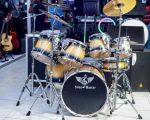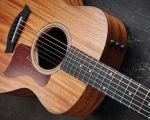Why Choosing the Right Electric Bass Guitar Matters for Jazz
As a jazz bassist, the connection between your instrument and your sound is essential. Unlike rock or pop music, jazz requires a deep sense of rhythm, harmony, and versatility. Picking the right electric bass guitar for jazz isn't just about looks or price—it’s about finding an instrument that complements your playing style, sound preferences, and musical needs. In this guide, I’ll walk you through some of the top-rated electric bass guitars for jazz and why they stand out from the rest.
1. Fender American Professional II Jazz Bass
When I think of a classic jazz bass, the Fender Jazz Bass is one of the first that comes to mind. Known for its smooth, articulate tone and versatile sound, the Fender American Professional II Jazz Bass is a dream come true for jazz musicians. This bass features a sleek alder body with a comfortable neck profile that’s perfect for those fast, intricate jazz lines. The newly designed V-Mod II pickups deliver crisp highs and warm lows, making it perfect for both walking bass lines and complex chord voicings.
The Fender Jazz Bass’s low action allows for smooth fingerstyle playing, and its clear, defined sound helps you cut through even the busiest of jazz ensembles. Whether you're playing with a small combo or a big band, the Fender Jazz Bass is an excellent choice for jazz players who want versatility and tone control in every situation.
2. Ibanez SR Premium SR1405PB
Ibanez is renowned for creating bass guitars that blend modern features with classic designs. The SR Premium SR1405PB is a high-end model that’s perfect for jazz musicians who want a bass that can do it all. The sleek and ergonomic body design allows for maximum comfort during extended gigs or practice sessions. With a range of tonal possibilities, thanks to the Nordstrand pickups and the custom EQ, this bass is ideal for jazz bassists who like to experiment with different sounds.
One of my favorite things about the Ibanez SR1405PB is the variety of tones it can produce. The active EQ system lets you shape your sound, emphasizing the lows for a smooth, round tone or boosting the mids for a more punchy, articulate sound. The extended range (5-string model) also gives you more room to explore deeper notes in your jazz compositions, adding depth to your overall sound.
3. Music Man StingRay Special 4HH
The Music Man StingRay Special 4HH is a powerhouse bass that brings serious punch and clarity to your jazz performance. Known for its distinctive humbucking pickups, this bass provides a rich and dynamic sound that is perfect for jazz players who like a bit of bite and sustain in their tone. The dual humbucker configuration offers a broader tonal range, from warm, smooth jazz lines to more aggressive and percussive slaps.
What really sets the StingRay apart is its playability. The fast maple neck and solid build make it easy to play complex jazz patterns, and the 18-volt preamp gives you more headroom to shape your tone. If you want a bass that can take you from smooth, walking lines to percussive slap bass with ease, the Music Man StingRay is a solid choice for any jazz bassist.
Things to Consider When Choosing an Electric Bass Guitar for Jazz
Choosing the right electric bass for jazz depends on a few key factors, including tone, playability, and versatility. Here are some things I always consider when selecting a bass for jazz:
1. Tonewood and Pickup Configuration
The tonewood of your bass plays a crucial role in shaping its overall sound. Basswood, alder, and maple are common tonewoods for jazz basses. Alder, for example, is known for its bright and punchy sound, while maple offers a sharp, crisp tone. Additionally, the choice of pickups (single-coil vs. humbucker) will influence your tonal options. Single-coil pickups give you that classic jazz bass tone, while humbuckers are great for those who want a smoother, more rounded sound.
2. Neck Profile and Playability
As a jazz bassist, you’ll be playing a lot of intricate lines and chords, so neck playability is critical. Look for a bass with a comfortable neck profile, something that feels good in your hands. A thinner neck profile might be ideal for players who like fast, fluid playing, while a thicker neck provides more stability and sustain. The length and scale of the neck also play a role in your comfort during performance.
3. Versatility in Sound
Jazz requires a wide variety of sounds, from mellow background lines to bright, cutting solos. Therefore, the versatility of your bass guitar is essential. A bass with an active or passive EQ system can help you fine-tune your sound, while different pickup configurations allow you to explore a range of tonal possibilities. If you want to stand out in a jazz ensemble, it’s essential to pick a bass that allows you to create both subtle and dynamic tones.
My Personal Journey with Jazz Bass Guitars
When I first started playing jazz, I was overwhelmed by the number of bass guitars available. My first bass was a basic Fender Precision, which was great for rock, but it didn’t quite fit my style when I delved deeper into jazz. After trying out several basses, I finally found my perfect match with a Fender Jazz Bass. The clarity, smooth tone, and playability fit my style perfectly. Over the years, I’ve experimented with several different basses, but I always come back to the Fender for its versatility and ability to express all the nuances of jazz.
Since then, I’ve also explored brands like Ibanez and Music Man, which offer fantastic options for jazz musicians who want something a bit more modern. The great thing about electric bass guitars for jazz is that there’s no one-size-fits-all approach—each model offers something unique to help you bring out your best sound.
Conclusion: Finding the Right Electric Bass for Your Jazz Sound
Ultimately, choosing the right electric bass guitar for jazz comes down to personal preference and playing style. The models I’ve mentioned—Fender American Professional II Jazz Bass, Ibanez SR Premium SR1405PB, and Music Man StingRay Special—are all top-rated basses that have proven to deliver excellent performance and tonal flexibility for jazz bassists. Whether you’re a beginner or an experienced player, each of these basses offers something unique to help you refine your jazz sound and stand out on stage.
Remember, the right bass will not only complement your playing style but also inspire you to push your creativity. Take your time to explore different models, and don’t be afraid to experiment with different tones and setups. With the right electric bass in your hands, you’ll be well on your way to mastering the art of jazz bass!








